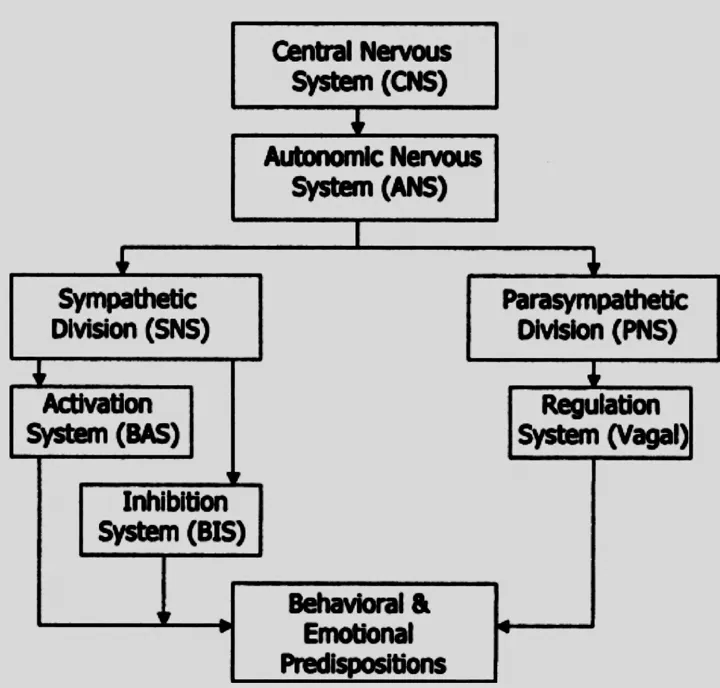ANS and Anxiety
The autonomic nervous system (ANS) is a division of the peripheral nervous system responsible for regulating involuntary bodily functions to maintain internal balance and respond to external stimuli. It operates without conscious control and consists of two main branches:
Sympathetic Nervous System (SNS):
This branch is often associated with the "fight or flight" response. When activated, it prepares the body for action by increasing heart rate, dilating airways, and redirecting blood flow to muscles, among other responses. It helps the body respond to stress or danger.
Parasympathetic Nervous System (PNS):
The PNS is often referred to as the "rest and digest" system. It promotes relaxation and recovery by slowing heart rate, constricting airways, and enhancing digestion and nutrient absorption. It helps restore the body to a state of rest after a stressor.
These two branches of the autonomic nervous system work in opposition to each other, striving to maintain equilibrium or homeostasis in the body. They regulate functions such as heart rate, blood pressure, respiratory rate, digestion, and more, to adapt to changing internal and external conditions.
The autonomic nervous system operates continuously, adjusting its activity based on the body's needs and external circumstances, often without conscious awareness. It plays a crucial role in maintaining overall physiological balance and responding to various physiological and emotional challenges.
Anxiety is often linked to the sympathetic nervous system's overactivity. When you're anxious, the SNS is triggered, leading to symptoms like increased heart rate, shallow breathing, and heightened alertness.
Reducing Anxiety:
Deep Breathing: Practice deep, slow breaths to activate the PNS and calm the SNS.
Mindfulness and Meditation: These techniques help you stay present and reduce racing thoughts.
Physical Activity: Regular exercise can reduce anxiety by promoting the release of mood-enhancing neurotransmitters.
Healthy Diet: Avoid excessive caffeine and sugar, and opt for a balanced diet to support stable blood sugar levels.
Adequate Sleep: Ensure you get enough restorative sleep, as lack of sleep can exacerbate anxiety.
Stress Management: Learn stress-reduction techniques like progressive muscle relaxation or yoga.
Therapy: Cognitive-behavioral therapy (CBT) and counseling can provide tools to manage anxiety.
Medication: In severe cases, a doctor may prescribe medication to help manage anxiety.
Lifestyle Changes: Simplify your life, prioritize self-care, and establish a routine to reduce stressors.
Social Support: Talk to friends, family, or a support group to share your feelings and gain perspective.
Remember, it's important to consult with a healthcare professional for personalized advice and treatment options if anxiety is significantly impacting your life.
© Metta_Zen
Sympathetic Nervous System (SNS):
This branch is often associated with the "fight or flight" response. When activated, it prepares the body for action by increasing heart rate, dilating airways, and redirecting blood flow to muscles, among other responses. It helps the body respond to stress or danger.
Parasympathetic Nervous System (PNS):
The PNS is often referred to as the "rest and digest" system. It promotes relaxation and recovery by slowing heart rate, constricting airways, and enhancing digestion and nutrient absorption. It helps restore the body to a state of rest after a stressor.
These two branches of the autonomic nervous system work in opposition to each other, striving to maintain equilibrium or homeostasis in the body. They regulate functions such as heart rate, blood pressure, respiratory rate, digestion, and more, to adapt to changing internal and external conditions.
The autonomic nervous system operates continuously, adjusting its activity based on the body's needs and external circumstances, often without conscious awareness. It plays a crucial role in maintaining overall physiological balance and responding to various physiological and emotional challenges.
Anxiety is often linked to the sympathetic nervous system's overactivity. When you're anxious, the SNS is triggered, leading to symptoms like increased heart rate, shallow breathing, and heightened alertness.
Reducing Anxiety:
Deep Breathing: Practice deep, slow breaths to activate the PNS and calm the SNS.
Mindfulness and Meditation: These techniques help you stay present and reduce racing thoughts.
Physical Activity: Regular exercise can reduce anxiety by promoting the release of mood-enhancing neurotransmitters.
Healthy Diet: Avoid excessive caffeine and sugar, and opt for a balanced diet to support stable blood sugar levels.
Adequate Sleep: Ensure you get enough restorative sleep, as lack of sleep can exacerbate anxiety.
Stress Management: Learn stress-reduction techniques like progressive muscle relaxation or yoga.
Therapy: Cognitive-behavioral therapy (CBT) and counseling can provide tools to manage anxiety.
Medication: In severe cases, a doctor may prescribe medication to help manage anxiety.
Lifestyle Changes: Simplify your life, prioritize self-care, and establish a routine to reduce stressors.
Social Support: Talk to friends, family, or a support group to share your feelings and gain perspective.
Remember, it's important to consult with a healthcare professional for personalized advice and treatment options if anxiety is significantly impacting your life.
© Metta_Zen
Related Stories







